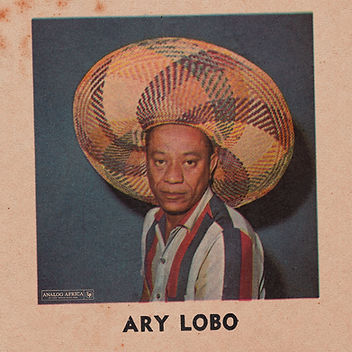

BLOG
Ary Lobo 1958-1966 (Limited Dance Edition No.19)
1.12.2023
Gabriel Eusébio dos Santos Lobo or just Ary Lobo has a new record compilation to be released by Analog Africa.
Whoever has been following the musical movements happening within our culture, must have noticed this young singer hailing from the North of Brazil. An absolute master of Baião, Côco, Batuque and other related musical genres and the owner of an art one hundred percent his own, Ary Lobo is the ideal interpreter of northeastern songs"
These words taken from the original liner notes of Ary Lobo’s first LP, “Forró con Ary Lobo” recorded in 1958, are in no way exaggeration. How many Brazilians have been bewitched by his voice nobody can say for sure but what is certain is that it is a voice that could have gone silent forever, as Biographer Elmo Barros explains:
"Hailing from Belém do Para in the north of the country, Ary Lobo was ready to launch his campaign on the south of the country and set out for Rio de Janeiro in October of 1955. There he encountered the usual southern biases against singers from the North and it was only after meeting Gadé, a respected pianist, that he was able to secure an audition at Rádio Mauá.
But the opportunity nearly turned into a disaster as he arrived to that session in such a frail state that he couldn't perform. Insufficient and irregular feeding had affected his breathing making it impossible to give his voice the necessary power. Fortunately the audition was postponed and on his second attempt he was able to secure a five month contract with the station were he became known as a Samba singer. As his reputation grew, he was signed To RCA Victor in June of 1956."
The music scene in Rio began catching wind of the newcomer who cultivated the personality of a Northeastern singer with deep roots in Afro-Brazilian heritage. He would kick start the new decade by recording what many describe as his best work, “Aqui mora o ritmo” (Here lives the rhythm) released in 1960. That album was followed a year later by “Cheguei Na Lua” (I arrived on the moon) in which he sang of his passion for space travelling and for the moon in particular.
But the moon was never going to be enough for Ary Lobo who had a gypsy soul and loved to wander the country, participating in “caravans” (as tours were called back then), performing in concert halls as well as playing in nightclubs, cabarets and bregas; those storied houses where cachaça was free-flowing, where resident prostitutes received their clients, and where the party often lasted until dawn. This demi-monde full of temptations was an inspirational paradise for a bohemian like Ary Lobo but also his fall from grace.
Ary Lobo recorded one LP every year until 1966 when he released “Quem É O Campeão?” (Who Is The Champion?) this last album for RCA Victor. All these recordings are wonderful road trips taking the listener through the various regions of Brazil; the tour guide on the journey is none other than Ary Lobo himself who, besides philosophy, science, politics and religion, would ornate the whole travel experience with an in-depth look into the traditions of a Brazilian society moving toward modernity.
Forró, as with so many genres, enjoyed its moment of greatness, but by the end of the 1960s, its popularity had started to fade and Ary Lobo was forced to start moving from one city to another in search of work opportunities. Eventually he arrived in Fortaleza, where he lived until his death in 1980.
Among the singers and songwriters to emerge from Pará in the 1950s, Ary Lobo’s achieved a level of national fame unique for his time. As an interpreter of more than 700 songs his records not only brought him great notoriety but also provided him with a lot of cash. “O nosso valor que venceu na Maravilhosa” (Our values that won in Rio)” was the headline the Paraense press used to describe Ary Lobo’s conquest of the south. But what exactly did his victory mean? For black and mulato artists coming from impoverished contingent of Brazilian society, the ability to play a leading role in the world of radio, recordings and live performances was a significant achievement. This makes it easier to understand why so much of the money Ary Lobo obtained from his musical success was spent on the conspicuous pleasures of being a star.
.jpg)
MUNDIAIS
